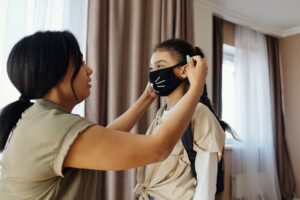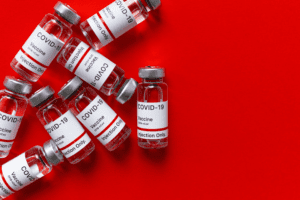 As the first marking period of the school year comes to a close, the Princeton Health Department continues to remain optimistic about the COVID-19 transmission rates in schools. Princeton schools (public, private and charter) have been following CDC recommended guidelines, including the importance of in-person learning with modifications in relation to the ever-changing COVID-19 pandemic.
As the first marking period of the school year comes to a close, the Princeton Health Department continues to remain optimistic about the COVID-19 transmission rates in schools. Princeton schools (public, private and charter) have been following CDC recommended guidelines, including the importance of in-person learning with modifications in relation to the ever-changing COVID-19 pandemic.
Key public health highlights and lessons leading into the 2021 fall school year include:
- Vaccination is the leading public health prevention strategy to end the COVID-19 pandemic. Promoting vaccination can help schools safely return to in-person learning as well as extracurricular activities and sports.
- Due to the highly contagious nature of the delta variant, the CDC recommends universal indoor masking in school settings, regardless of vaccination status. (Required through Governor Murphy’s Executive Order)
- Screening testing, ventilation, handwashing and respiratory etiquette, staying home when sick and getting tested, contact tracing in combination with quarantine and isolation, and cleaning and disinfection are also important layers of prevention to keep schools safe.
- Localities should monitor community transmission, vaccination coverage, screening testing, and occurrence of outbreaks to guide decisions on the level of layered prevention strategies (e.g., physical distancing, screening testing)”
When evaluating the success of the 2021 fall school year to date, it is important to note the dates K-12 COVID-19 guidance was released. Much of the COVID-19 public health guidance for schools was going through several iterations through the end of summer due to quickly changing case transmission rates, resulting from the delta variant. Updated K-12 COVID-19 guidance was released on August 5, 2021 by the Centers for Disease Control and by the New Jersey Department of Health guidance on September 1, 2021. The distribution of COVID-19 health guidance to New Jersey school districts was likely made more difficult by the quickly changing landscape of COVID-19. Per the CDC: “In late June, the national 7-day moving average of reported cases was around 12,000. On July 27, the national 7-day moving average of cases reached over 60,000.” As the delta variant has been found to be twice more infectious compared to the initial variants of alpha, beta and gamma, and there have been a number of breakthrough COVID-19 cases, most protocols were adapted to decrease the spread of COVID-19 including universal masking to protect all staff and children, regardless of vaccination status.
 With the increased number of cases leading into the fall 2021 school year, certain public health protections utilized in the 2020-2021 school year were recommended yet again for another school year. Those recommendations included maintaining 6 feet of distance between students and staff when possible, but reducing that number to as little as 3 feet of distance if students and staff were properly wearing masks. The Princeton Health Department encouraged all Princeton schools to utilize the 6-foot distance in as many scenarios as possible, in particular when contact tracing was being performed. As of November 9th, there have been 10 confirmed outbreaks with 46 linked cases in Mercer County and in New Jersey, there have been 160 school outbreaks and 860 cases linked to those school outbreaks. Governor Murphy has continued to state in COVID-19 press conferences that the COVID-19 numbers are “well within the range of any acceptable outcome at the moment in schools.” The Princeton Health Department agrees with the Governor’s assessment, particularly when we review the timeline of the guidance being released, quick action by schools to increase health precautions in place to account for the more contagious delta variant and increased number of students in the classroom due to the inability for schools to utilize the remote learning option.
With the increased number of cases leading into the fall 2021 school year, certain public health protections utilized in the 2020-2021 school year were recommended yet again for another school year. Those recommendations included maintaining 6 feet of distance between students and staff when possible, but reducing that number to as little as 3 feet of distance if students and staff were properly wearing masks. The Princeton Health Department encouraged all Princeton schools to utilize the 6-foot distance in as many scenarios as possible, in particular when contact tracing was being performed. As of November 9th, there have been 10 confirmed outbreaks with 46 linked cases in Mercer County and in New Jersey, there have been 160 school outbreaks and 860 cases linked to those school outbreaks. Governor Murphy has continued to state in COVID-19 press conferences that the COVID-19 numbers are “well within the range of any acceptable outcome at the moment in schools.” The Princeton Health Department agrees with the Governor’s assessment, particularly when we review the timeline of the guidance being released, quick action by schools to increase health precautions in place to account for the more contagious delta variant and increased number of students in the classroom due to the inability for schools to utilize the remote learning option.
 In Princeton, 99% of those over 65-years old are vaccinated, 82% of those over 18-years, and 82% of those 12-years and over are vaccinated, yet we still remain in the medium-high rate COVID-19 activity for transmission. Early on in the school year, Princeton was fortunate to have nearly 95% of Princeton residents 12-17 years old vaccinated. The health department has observed this significant vaccination rate as a primary reason for the lower school transmission levels in Princeton compared to some neighboring towns. According to the American Academy of Pediatrics, children (0-17 years of age) now account for about 27% of all reported cases in the U.S. as of late October, compared to 16.2% of the total cumulative cases since the pandemic began. This figure is skewed towards the <5-year-old population due their lack of eligibility for the COVID-19 vaccine. With the vaccine being approved on October 29th, 2021 for 5-11 year olds, it is anticipated that case rates will soon decrease as vaccination rates in that age range begin to increase.
In Princeton, 99% of those over 65-years old are vaccinated, 82% of those over 18-years, and 82% of those 12-years and over are vaccinated, yet we still remain in the medium-high rate COVID-19 activity for transmission. Early on in the school year, Princeton was fortunate to have nearly 95% of Princeton residents 12-17 years old vaccinated. The health department has observed this significant vaccination rate as a primary reason for the lower school transmission levels in Princeton compared to some neighboring towns. According to the American Academy of Pediatrics, children (0-17 years of age) now account for about 27% of all reported cases in the U.S. as of late October, compared to 16.2% of the total cumulative cases since the pandemic began. This figure is skewed towards the <5-year-old population due their lack of eligibility for the COVID-19 vaccine. With the vaccine being approved on October 29th, 2021 for 5-11 year olds, it is anticipated that case rates will soon decrease as vaccination rates in that age range begin to increase.
Similar to the hardships experienced by Princeton’s business community, the past 18 months of the pandemic have been extremely difficult for students, teachers, school administration, health and school families. It is imperative that we all continue to work together and look out for one another in this ongoing battle against COVID-19. With each step in the right direction, we seem to find ourselves standing against new obstacles and challenges. The Princeton community is fortunate to have residents who have really banned together and followed the science and public health guidance to keep our community safe and healthy.

Jeffrey Grosser currently serves as the Director of Health, overseeing the Health Department and Bureau of Rental Inspection for the Municipality of Princeton. As Director, Mr. Grosser is responsible for the administration of public health practice standards in Princeton.
Under his leadership, the health department became only the third local health department in New Jersey (and one of the smallest in the country) to achieve national public health accreditation in November 2018 through the Public Health Accreditation Board (PHAB). Prior to his time in Princeton, Mr. Grosser worked for the Burlington County Health Department. He began his public health career as an Environmental Health Specialist and finished his time there as Program Manager of Disease Prevention and Control, overseeing Communicable Disease, Mosquito Control and the Animal Shelter. Beyond governmental public health, Mr. Grosser has served as an adjunct faculty member at Stockton University’s School of Health Sciences since 2013.
